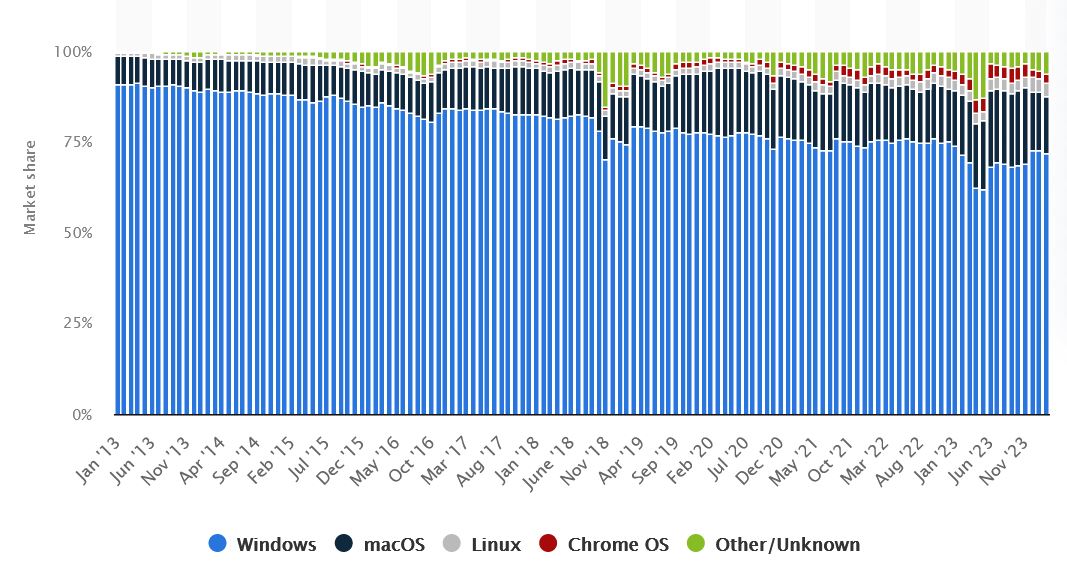libnix
12 apr 2024
motivation
this libnix nlnet application i’ve made is meant to contribute to the nix ecosystem by making nix a generic cross platform backend for language specific package managers.
it consists of two parts:
- nix on windows - port nix to windows
- libnix PM backend - use nix as a backend for language specific package managers “PMs” (node, pip, cargo, …)
or in simpler terms, figuring out a way to make nix more attractive for the industry so can be used during development and not only for deployment afterwards.
introduction
nix, the purely functional programming language and package manager, has been around since 3. jun 2003 - roughly 20 years. yet there is no vast industry adaption of nix (or nixos). why is that?
in parts:
- most development is done from and sometimes also for the windows platform
- wrapping language specific PMs with nix is hard
- technology stacks are selected by the lowest common denominator
- running IDEs on remote machines is not a common practice
PC desktop OS usage
it is worth to have a look at the global market share held by operating systems for desktop PCs, from january 2013 to february 2024:
taking macOS + Linux together, nix could be used on ~20% of the desktops.
PC gaming OS usage
the valve steam statistics for march 2024 show:
- 96.67% windows
- 1.94% linux
- 1.38% mac
the gaming industry is a good early indicator for the general desktop usage with valve being a key driver in linux adaption together with AMD.
nixcon surveys
the nix-surveys shed some light on how this is perceived by the nix community:
OS summary
with nix working only on unix like environments, one can’t expect vast adoptions unless the windows reign is over. nix is strongly designed for unix like systems. this might happen due to major macOS market share gains or the linux desktop
nixos, in particular, is strongly tied to a linux kernel and systemd, but we don’t mention this much onwards as the focus is on nix as a package manager.
the mission
given the motivation and statistics, the mission is to make software development more about development and less about package management. this will be done by using nix as a generic cross platform backend for language specific package managers.
nix on windows
before we go into a native nix on windows we have to look at nixos-wsl using WSL2.
nixos-wsl
using nixos-wsl with nixos-vscode-server via ssh is the most convenient way to work with nix on windows today. i’ve been using nixos-wsl a lot and it works for development and is much better compared to VM based development. that said, nixos-wsl is no replacement for a native windows experience, especially in regards to IDE integration and runtime performance.
native nix on windows
for historic reasons we should also mention the ternaris report from 2015 which outlines obstacles to overcome: https://ternaris.com/lab/nix-on-windows.html. in parts this has been outdated but it still might be an interesting read.
if you want to join development for a native nix on windows, see these resources:
- https://matrix.to/#/#windows:nixos.org
- https://discourse.nixos.org/t/nix-on-windows/1113
- https://github.com/NixOS/GSoC/blob/main/ideas/2024.md
since nix is c++, bash and perl there are some things to consider:
or maybe start with the rust port of nix?
summary
the next post in the libnix series will cover the current status of nix on windows.
libnix - language specific PMs considerations
language specific PMs like npm, yarn, cargo, conan, pip, … are the most common way to manage software stacks in the industry. some of them are even cross platform already!
key observations 2024:
- nix is strong with open programming languages as python, c++, haskell and some others but lacks support for languages with rather closed eco systems as c#, android and ios development
- nix support for languages like c/c++ is rather good as they don’t use PMs
- PM abstraction is hard when:
- mixing languages and build systems, for instance, when using a c library in a python project with a seldom used build system
- build scripts are not easily patchable
- build scripts use lots of /lib /bin and similar assumptions about programs but have no way to override them
- PMs which already feature a lock file concept are easy to integrate with nix (yarn.lock, package.lock, …)
the main challenge here is how well these can be integrated with nix!
traditional wrapping
most PMs are wrapped using nix abstractions, see https://nixos.wiki/wiki/Language-specific_package_helpers and on program updates these need to be redone.
PM anatomy
language specific package managers (like cargo, npm) solve these problems:
- resolve dependencies
- using/creating lock files for toolchains and dependencies
- downloading dependencies
- manage build artifact caches (i.e. .cargo, .conan, .npm, …) for faster builds and garbage collecting them eventually
- build target program or library
- wrap native software like openssl, libxml for runtime or compilers like gcc for build time actions
- install routines for the target program or library
ideally this only means a manual run of some tool like node2nix but often times it means a manual patching of build scripts.
examples
these two projects have the concept of libnix already implemented:
i will look into these in more detail in the next post about libnix series.
summary
windows nix support matters because then we can share package management concepts between operating systems. ideally we can make nix into a generic backend for PMs making software development great again!

